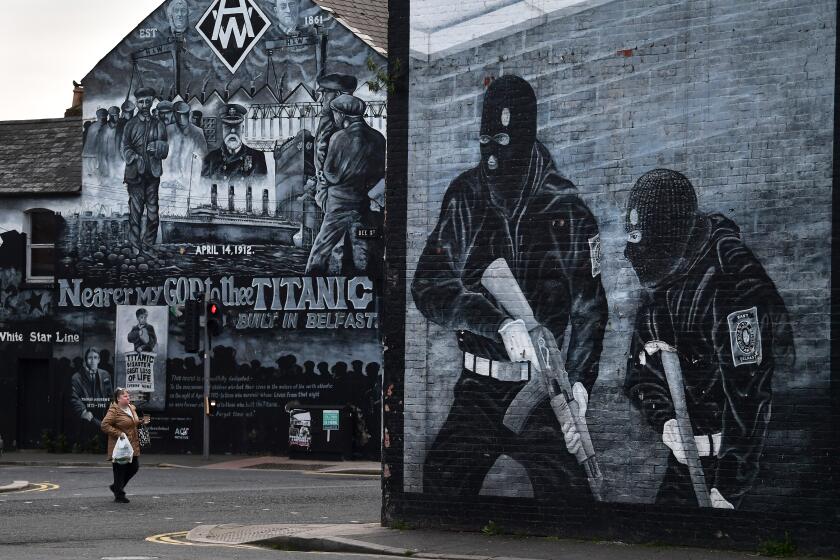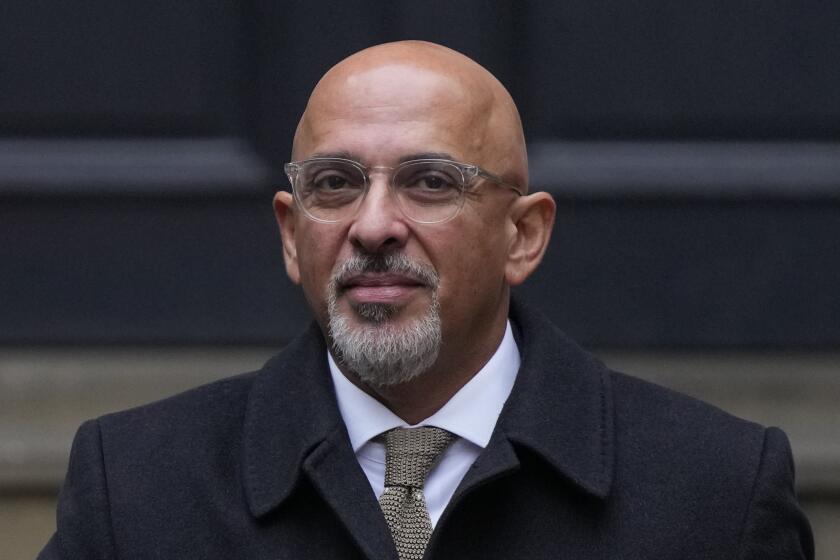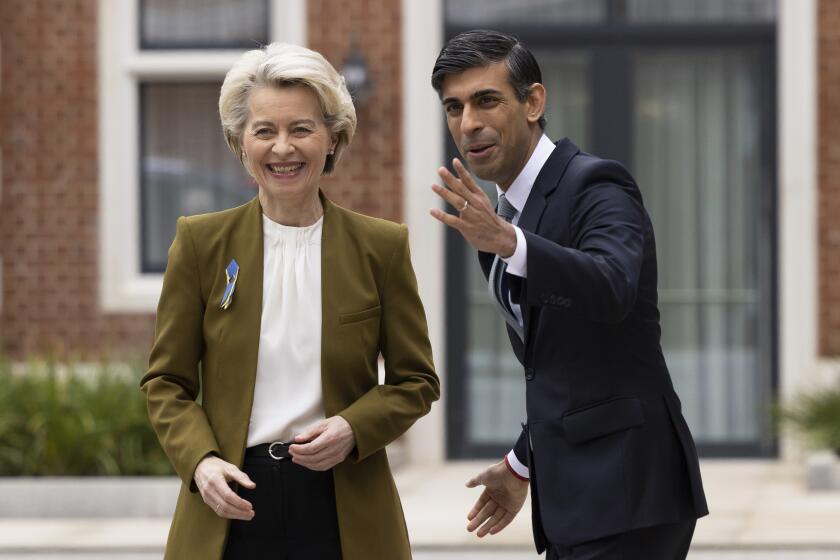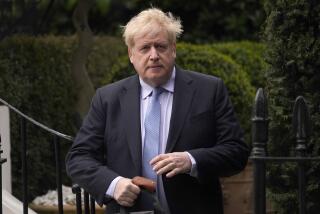Britain’s deputy prime minister resigns after investigation into bullying complaints
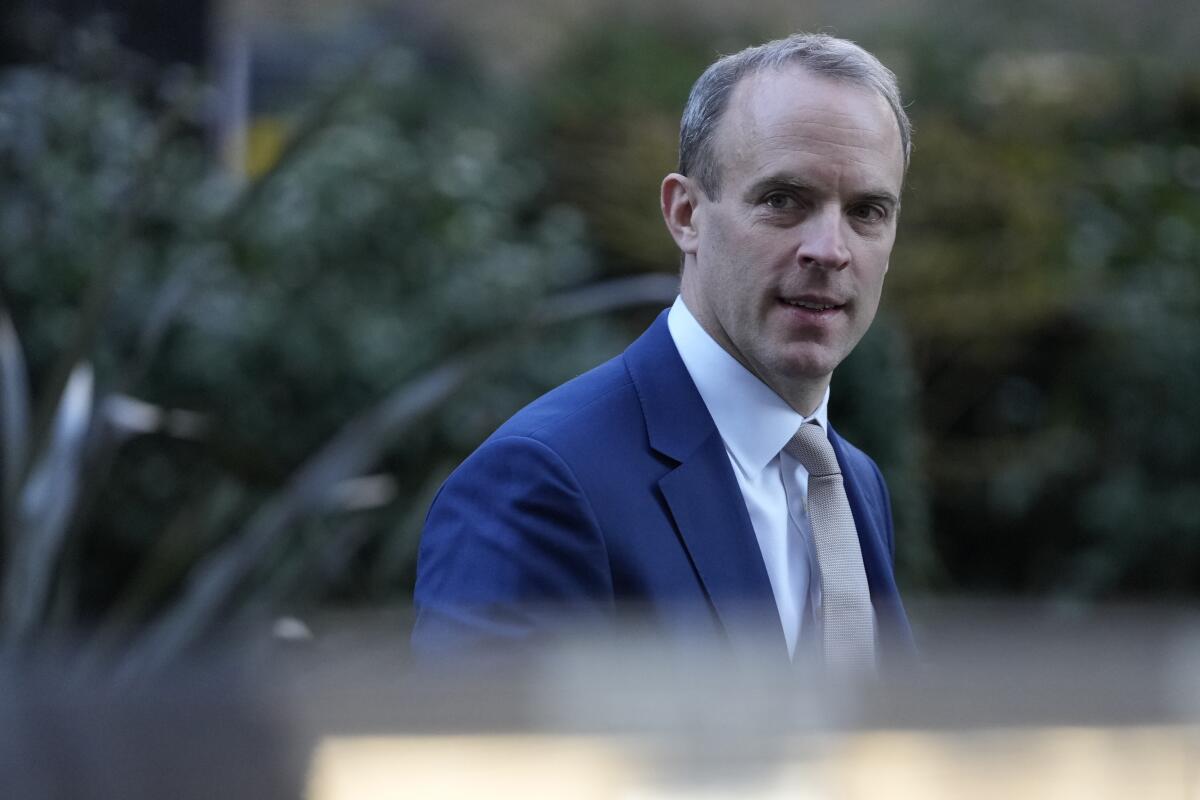
- Share via
LONDON — British Deputy Prime Minister Dominic Raab resigned Friday after an independent investigation found that he bullied civil servants, though he criticized the report as “flawed.”
His announcement came a day after Prime Minister Rishi Sunak received the findings of an investigation into eight formal complaints that Raab, who is also justice secretary, had been abusive toward staff during a previous stint in that role and while serving as Britain’s foreign secretary and Brexit secretary.
Attorney Adam Tolley, who conducted the investigation, said Raab “acted in a way which was intimidating,” was “unreasonably and persistently aggressive” and “introduced a punitive element” to his leadership style.
“His conduct also involved an abuse or misuse of power in a way that undermines or humiliates,” Tolley wrote in the 48-page report. “His conduct was bound to be experienced as undermining or humiliating by the affected individual, and it was so experienced.”
Raab, 49, denied allegations that he belittled and demeaned his staff and said he “behaved professionally at all times,” but said he was resigning because he had promised to do so if the bullying complaints were upheld.
The investigation made two findings of bullying and dismissed the other complaints, Raab said in his resignation letter. But he called the findings “flawed” and said the inquiry “set a dangerous precedent” by “setting the threshold for bullying so low.”
Northern Ireland wants to move forward. But 25 years after the Good Friday accord celebrated by Clinton and Biden, many are mired in a painful past.
He said he quit because he was “duty bound” to resign since he had promised to.
In a letter that praised much of the work Raab had done, Sunak said he accepted the resignation “with great sadness.” He also referred to “shortcomings” in the investigation, which he said had “negatively affected everyone involved.”
The resignation spared Sunak from having to determine the fate of his top deputy.
If he had fired Raab, he would have opened himself to criticism for hiring him in the first place; if he had kept him in the job, he would have been criticized for failing to follow through on his promise to restore integrity to the Conservative-led government.
Sunak received the investigation report Thursday morning and didn’t immediately make a decision. Spokesperson Max Blain, speaking before Raab’s resignation, said Sunak still had “full confidence” in Raab while he reviewed the report.
Rishi Sunak had faced pressure to sack Nadhim Zahawi amid allegations he settled a multimillion-dollar unpaid tax bill when he ran Britain’s Treasury.
Britain’s ministerial code of conduct requires ministers to treat people with respect and have proper and appropriate relationships with colleagues, civil servants and staff. It says harassment, discrimination and bullying will not be tolerated.
Sunak’s delay in not acting swiftly, as he promised, gave his political opponents an opportunity to attack him for dithering.
Opposition leader Keir Starmer of the Labor Party criticized Sunak for failing to fire Raab.
“What I think this shows is the continual weakness of the prime minister,” Starmer told broadcasters. “He should never have appointed him in the first place, along with other members of the Cabinet that shouldn’t have been appointed, and then he didn’t sack him. Even today, it’s Raab who resigned rather than the prime minister who acts.”
Britain and the European Union finally reach a post-Brexit agreement that will allow goods to flow freely to Northern Ireland from the rest of the U.K.
Raab was elected to Parliament in 2010 and unsuccessfully sought to become Conservative Party leader, and therefore prime minister, in 2019 before throwing his support behind Boris Johnson. Appointed deputy prime minister under Johnson, he briefly took charge of the government when Johnson was hospitalized with COVID-19 in April 2020.
Raab said in his letter that he had “not intentionally belittled anyone” and was “genuinely sorry for any unintended stress or offense that any officials felt.”
He noted that the inquiry concluded he had not “sworn or shouted at anyone, let alone thrown anything or otherwise physically intimidated anyone.”
The report is the latest ethics headache for Sunak, who vowed to restore order and integrity to government after three years of instability under predecessors Johnson and Liz Truss. Multiple scandals brought Johnson down in summer 2022, and Truss quit in October after just six weeks in office when her tax-cutting economic plans sparked mayhem in the financial markets.
Start your day right
Sign up for Essential California for the L.A. Times biggest news, features and recommendations in your inbox six days a week.
You may occasionally receive promotional content from the Los Angeles Times.
But Sunak has struggled to shake off opposition allegations that the Conservative government remains mired in scandal and sleaze.
A parliamentary watchdog announced this week that it was looking into whether Sunak properly disclosed his wife’s interest in a company that stands to benefit from a massive boost to free child care in his administration’s budget.
A member of Sunak’s Cabinet, Gavin Williamson, quit in November over bullying claims. In January, Sunak fired Conservative Party chairman Nadhim Zahawi for failing to come clean about a multimillion-dollar tax dispute.
A separate inquiry is underway into claims that Johnson secured a loan with the help of a Conservative donor, Richard Sharp, who was later appointed chairman of the BBC.
More to Read
Sign up for Essential California
The most important California stories and recommendations in your inbox every morning.
You may occasionally receive promotional content from the Los Angeles Times.
